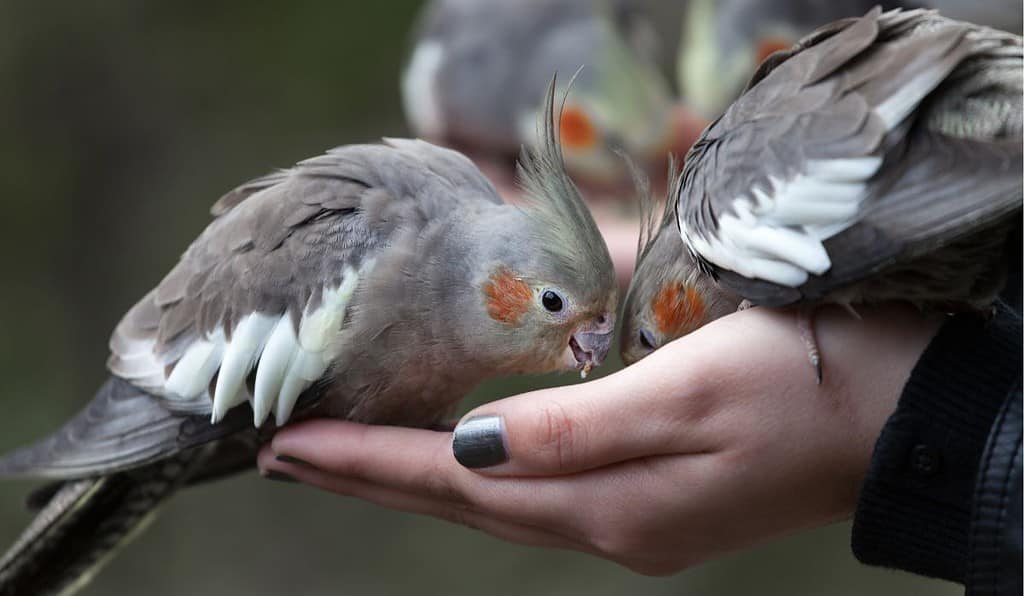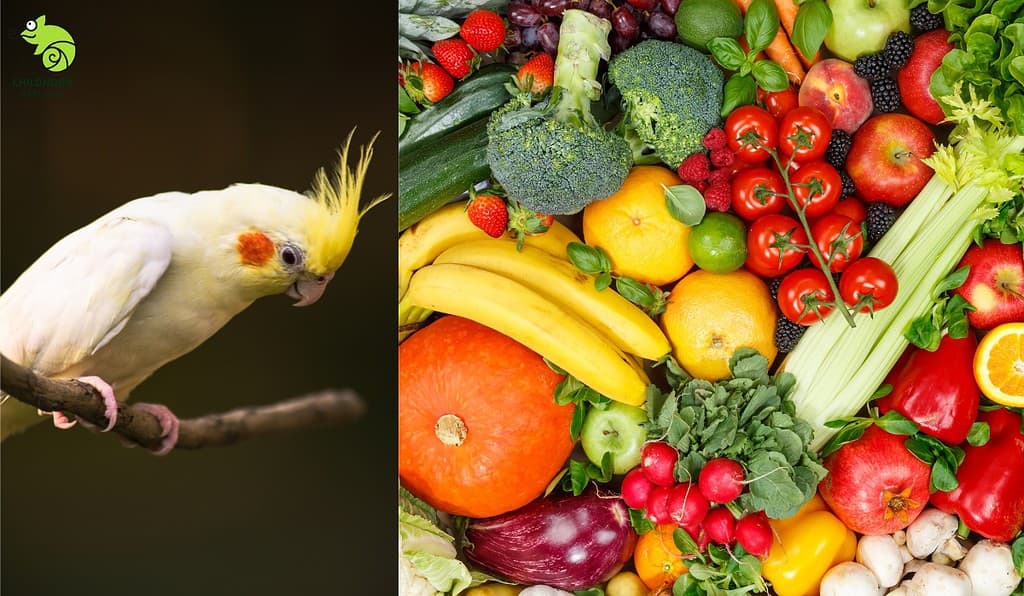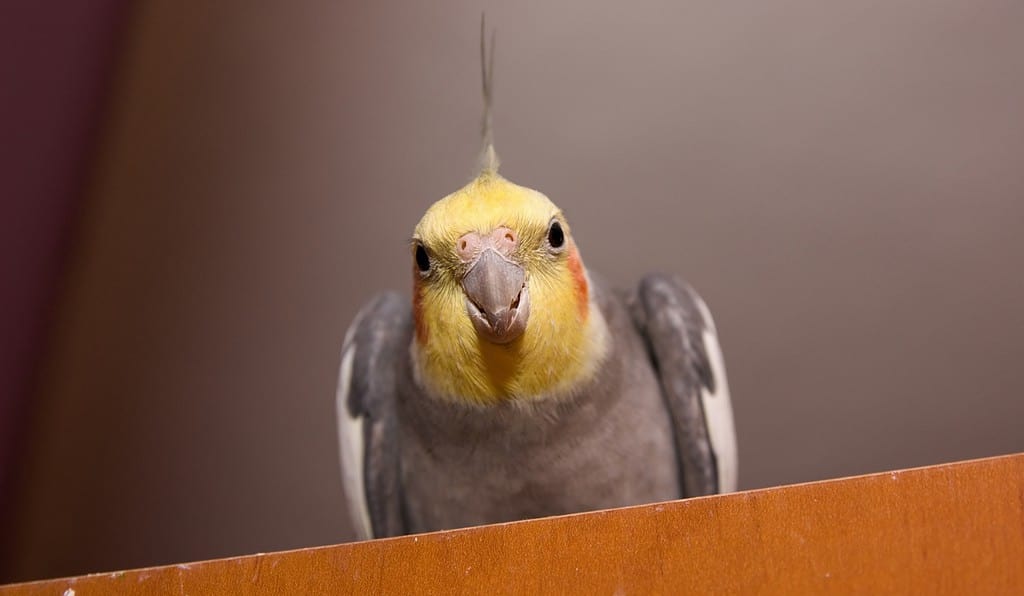
What a cockatiel eats plays a pivotal role in their health, longevity, and overall happiness. It’s a world where seeds meet fruits, and nutrition dances with taste, ensuring each chirp is a note of well-being.
As a general rule, a cockatiel’s diet should include a mix of seeds, fruits, vegetables, and high-quality pellets. Ensure fruits and greens make up at least 20-25% of their diet, and always remove toxic seeds before feeding.
Eager to embark on a nutritional adventure for your cockatiel? Ready to see those feathers gleam with health and those eyes sparkle with vitality? Dive in as we explore the diverse world of a cockatiel’s diet, ensuring each meal is a step towards a happier, healthier bird. Let the journey begin, and let the chirping resonate with joy and vibrancy!
What Can Cockatiels Eat?
Now, as we flutter into the specifics, it’s essential to understand that a balanced diet is paramount for your cockatiel. A mix of seeds, fruits, vegetables, and high-quality pellets can make all the difference, offering a spectrum of nutrients ensuring their feathers stay glossy, eyes sparkling, and songs melodious.
Seeds
Cockatiels have a penchant for seeds, and why wouldn’t they? Seeds are packed with the energy they need for all their flitting and chirping.
Types of seeds cockatiels can eat:
- Sunflower seeds
- Millet
- Canary seed
- Hemp seeds
- Safflower seeds
Each seed type brings its own nutritional punch to the table, ensuring your cockatiel gets a well-rounded diet.
The nutritional value of seeds:
| Seed Type | Protein | Fat | Fiber |
| Sunflower | High | High | Low |
| Millet | Medium | Low | High |
| Canary Seed | Medium | Medium | Medium |
| Hemp Seeds | High | High | Medium |
| Safflower Seeds | Medium | High | Low |
Each type of seed has its unique nutritional profile, contributing to the overall well-being of your cockatiel. Remember, moderation is key, and variety is the spice of life, even for our feathered friends!
Fruits and Vegetables

As we soar further into the world of cockatiel nutrition, let’s not forget the vibrant array of fruits and vegetables. These colorful additions to their diet not only add a burst of flavors but also infuse a wealth of vitamins and minerals essential for their robust health. Cockatiels regularly crave fresh fruits and vegetables to mimic the naturally varied food they relish in the wild. Ensuring fruits and greens make up at least 20% of their regular diet is a ticket to their optimal health.
List of safe fruits for cockatiels:
- Bananas
- Apples (ensure no seeds)
- Grapes
- Peaches
- Apricots
- Pears
- Strawberries
- Blackberries
- Kiwi
- Guava
- Papaya
- Mango
- Cherries
- Melon
- Pomegranate
- Nectarines
Cockatiels also relish dried fruits such as raisins, dates, plums, cranberries, and prunes. However, caution is the watchword as some fruit seeds can be toxic to them. Always ensure seeds in fruits are removed before feeding.
For a vitamin C boost, consider fruits like oranges, grapefruit, kiwi, and mangoes. All-season fruits like apples, grapes, bananas, and various types of berries are also a hit among cockatiels.
Benefits of including fruits and vegetables in their diet:
- Packed with essential vitamins and minerals.
- Provides hydration and moisture.
- Adds variety and excitement to their diet.
- Enhances feather color and brightness.
- Supports immune system health.
When it comes to vegetables, the darker the leaves, the better.
Leaf lettuce, cabbage, cauliflower, kale, and watercress are excellent choices. Don’t forget orangey and yellowish vegetables like sweet potatoes, rich in Vitamin A, and other veggies like carrots, asparagus, string beans, corn, and tomatoes, which make delightful additions to their diet.
Each fruit and vegetable is a treasure trove of nutrients, ensuring your cockatiel is brimming with vitality, ready to spread their wings in the bliss of health and happiness!
Pellets
Now, let’s talk pellets. Pellets are a fantastic source of balanced nutrition for your cockatiel. They are formulated to provide all the essential nutrients in each bite, ensuring no nutrient is left behind.
Nutritional completeness of pellets:
Pellets offer a balanced diet with the right proportions of proteins, vitamins, and minerals, ensuring your cockatiel’s nutritional needs are met comprehensively.
How to choose the right pellets for cockatiels:
- Opt for high-quality brands with natural ingredients.
- Ensure they are specifically formulated for cockatiels.
- Check for the absence of artificial colors, flavors, and preservatives.
- Consider the size and hardness suitable for your cockatiel.
Foods to Avoid
As we navigate the nutritional landscape, it’s crucial to steer clear of certain foods that can be harmful to your cockatiel.
Foods that are harmful to cockatiels:
| Harmful Food | Explanation |
| Avocado | Contains persin, toxic to birds |
| Chocolate | Contains theobromine, toxic to birds |
| Onions and Garlic | Contains sulfoxides and disulfides, can cause anemia |
| Caffeine | Can cause cardiac malfunction |
| Alcohol | Can cause liver and kidney damage |
Consequences of feeding these foods:
- Can lead to serious health issues and complications.
- May cause digestive distress and discomfort.
- Potential to cause long-term damage to organs.
- Can lead to fatal poisoning.
Embarking on this journey of understanding and providing the best nutrition for your cockatiel is a beautiful expression of love and care. Remember, a happy, healthy cockatiel is a singing, chirping, and loving companion, bringing joy and warmth to your home. Fly high with the right nutrition, and let the melodious chirping fill your abode with happiness and love!
Transitioning to a New Diet

Embarking on a new dietary journey for your cockatiel? It’s crucial to ensure the transition is as smooth as a feather’s glide.
Tips and guidelines for safely transitioning cockatiels to a new diet:
- Start by mixing a small amount of the new food with their current diet.
- Gradually increase the new food while decreasing the old food over a week.
- Monitor your cockatiel closely for any changes in behavior, weight, or droppings.
- Ensure fresh water is always available.
- Consult your vet if you notice any adverse reactions or issues.
Importance of gradual dietary changes:
Gradual changes are vital to prevent digestive upset and allow your cockatiel to adjust to the new flavors and textures, ensuring a seamless transition to a healthier, happier life.
Cockatiel’s Eating Behavior
Understanding the eating behavior of cockatiels is like holding the key to their well-being. They have preferences and needs that are essential to their health and happiness.
Cockatiels’ feeding habits and preferences:
Cockatiels often enjoy a variety of foods, showing a preference for seeds, fruits, and vegetables. They also enjoy foraging, so providing food in a way that allows them to search and explore is beneficial.
The importance of a balanced diet and regular feeding schedule:
- Ensures optimal health and vitality.
- Prevents nutritional deficiencies.
- Maintains healthy weight and energy levels.
- Contributes to a vibrant and glossy feather coat.
Health Implications of Diet
The saying, “You are what you eat,” holds true for our feathered friends as well.
Health implications of a poor diet:
A poor diet can lead to various health issues, including obesity, malnutrition, and weakened immune systems, making them more susceptible to illnesses.
Signs of nutritional deficiencies and how to address them:
| Signs of Deficiencies | Solutions |
| Dull, brittle feathers | Include a variety of fresh fruits and vegetables |
| Weight loss or gain | Consult a vet and adjust diet accordingly |
| Lethargy | Ensure a balanced diet and regular feeding schedule |
| Changes in droppings | Monitor diet and consult a vet if issues persist |
Frequently Asked Questions
Can cockatiels eat salt?
No, salt should be avoided as it can be harmful to cockatiels.
What is a cockatiel’s favorite fruit?
Cockatiels often enjoy apples, berries, and other fresh fruits. Ensure all fruits are washed and seeds are removed.
Can you give bread to cockatiels?
Yes, in moderation. Ensure it’s plain bread without added salt, sugar, or spices.
Conclusion
Did you find this journey through cockatiel nutrition enlightening? It’s a world filled with vibrant fruits, crunchy seeds, and nourishing pellets, all coming together to ensure your cockatiel’s radiant health and joyful chirps. Your feathered friend relies on you to make the best dietary choices for them, ensuring they soar high in health and happiness. Feel free to share your thoughts, experiences, and questions in the comments below. Together, let’s make the world a happier place for our cockatiels!
